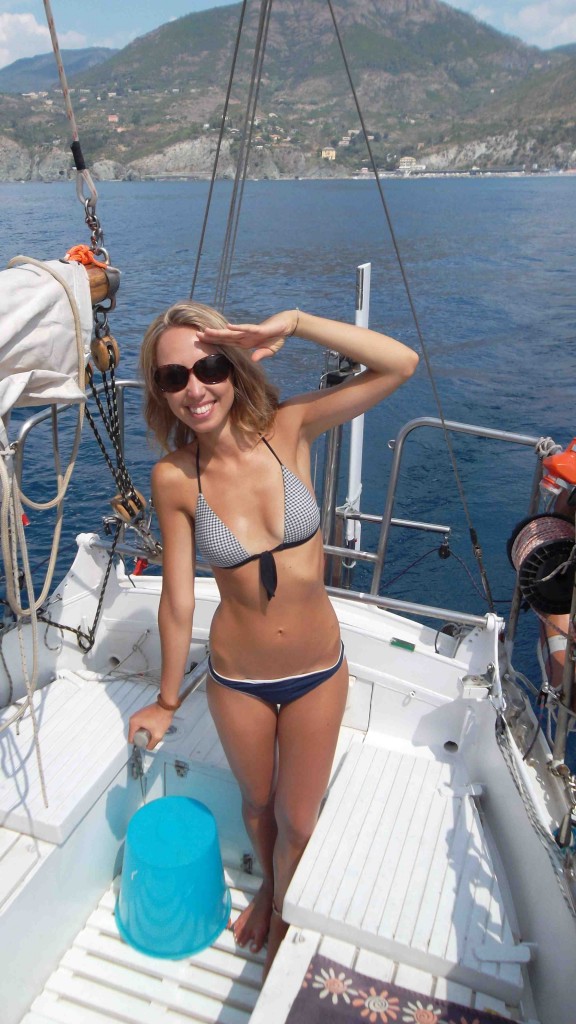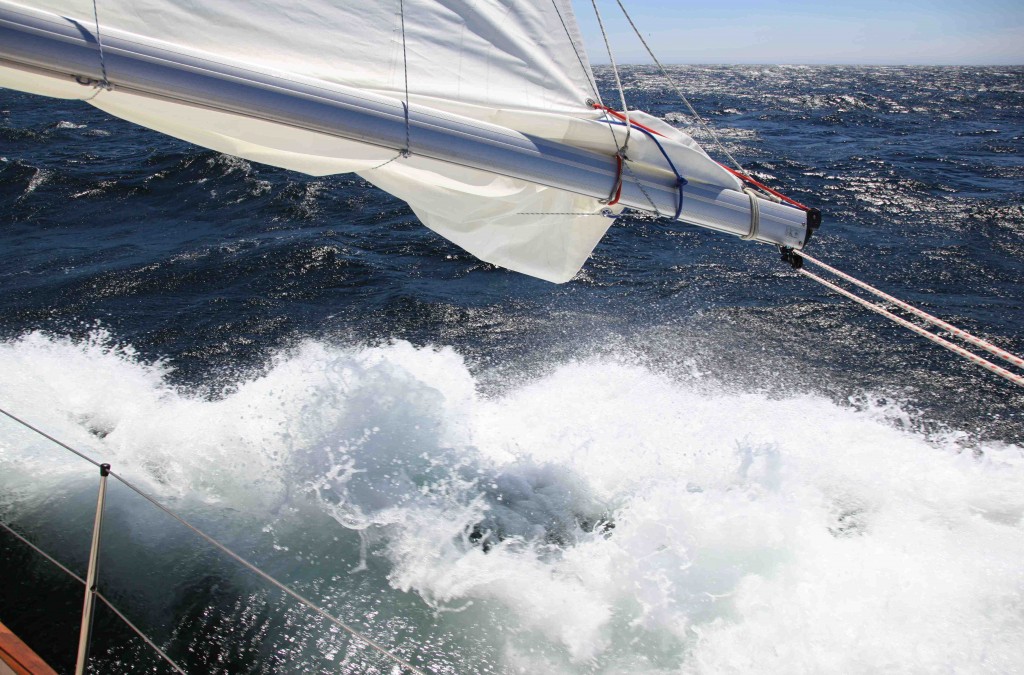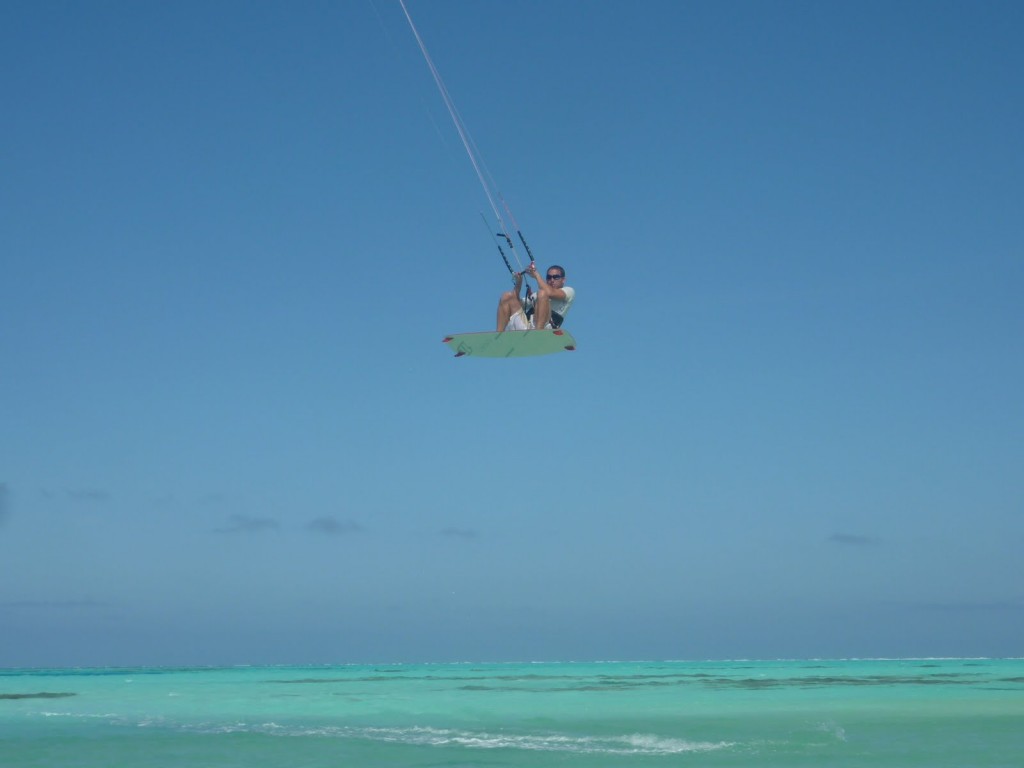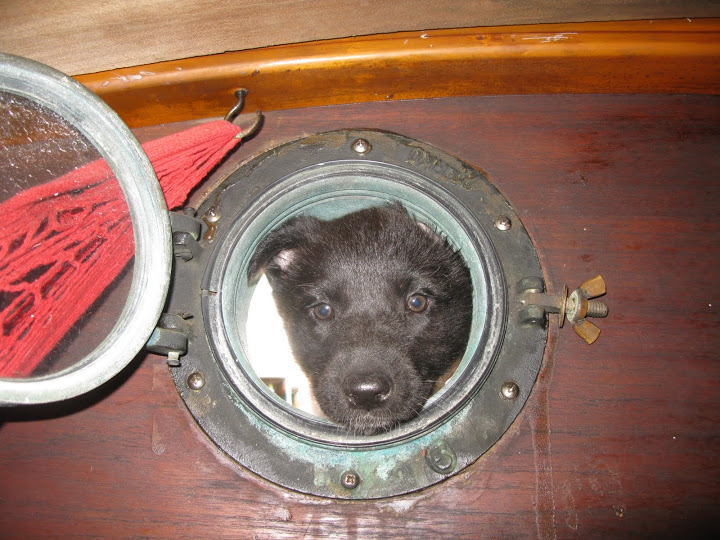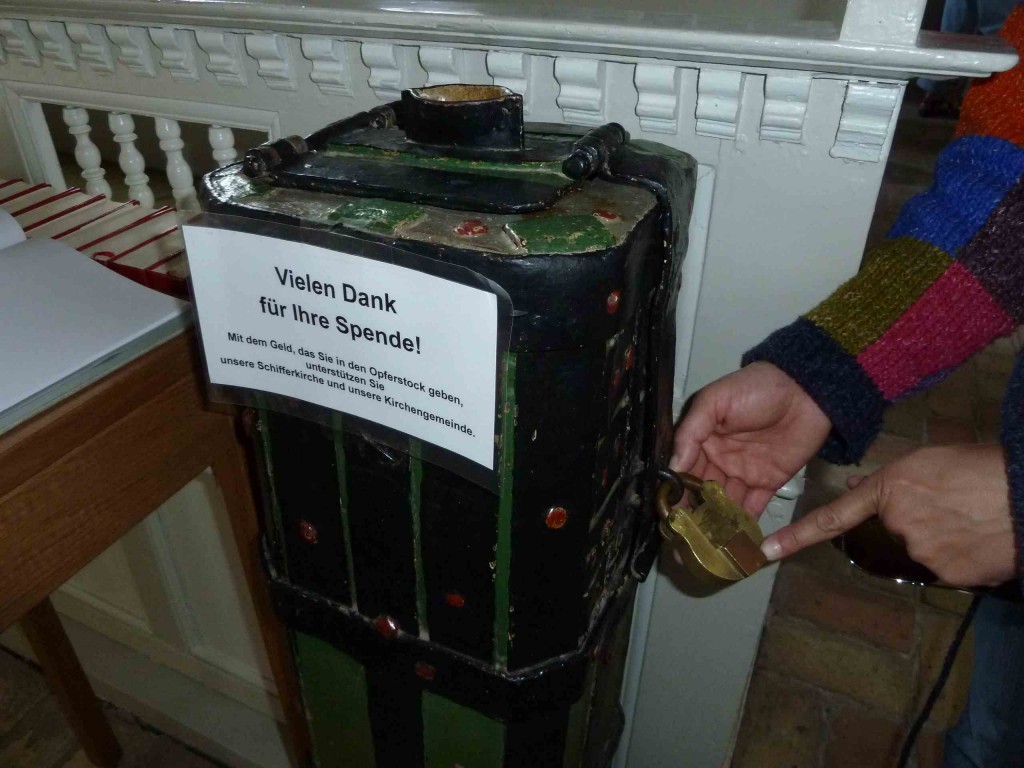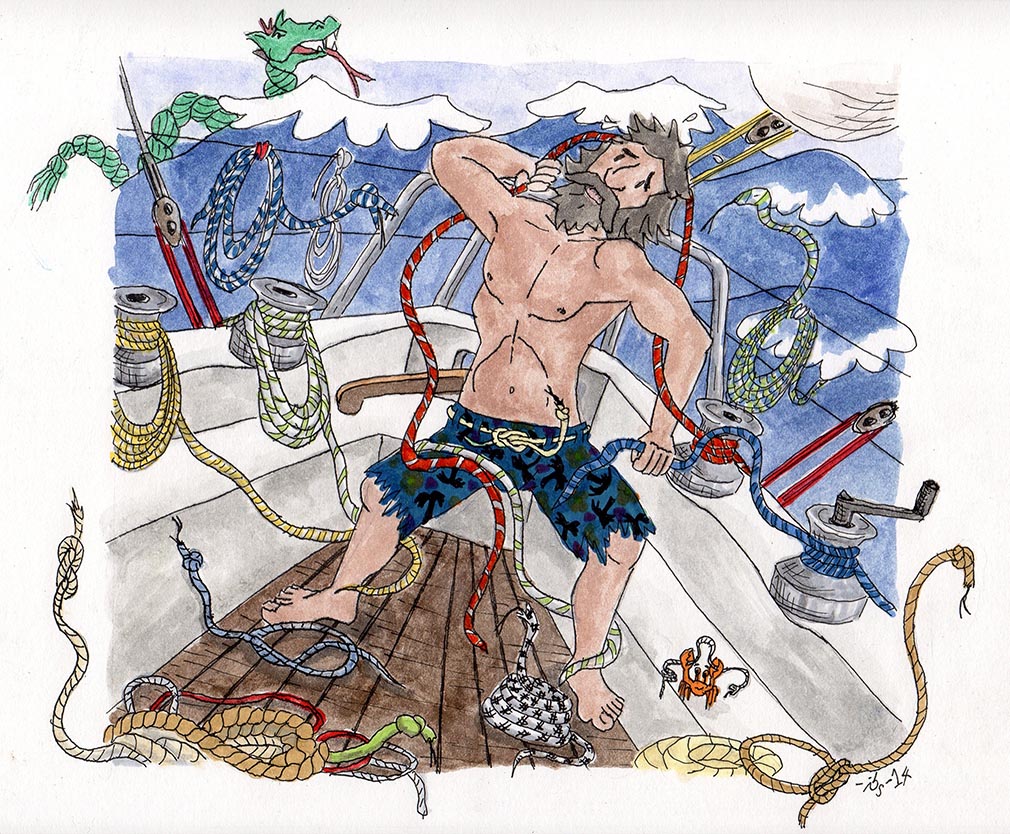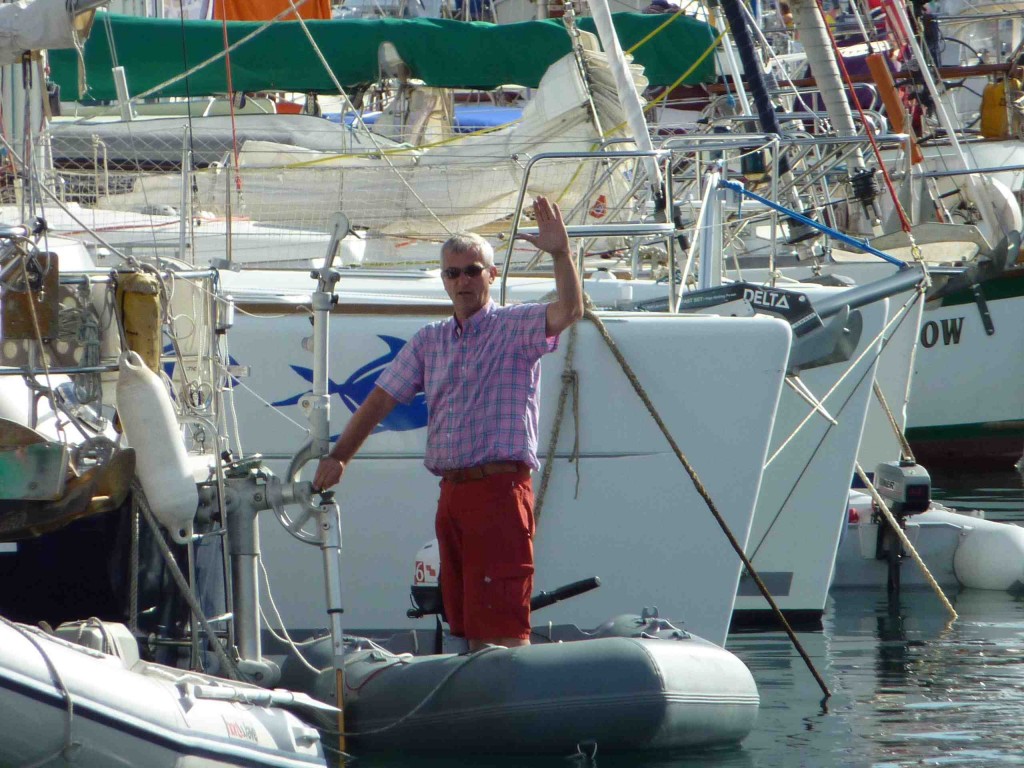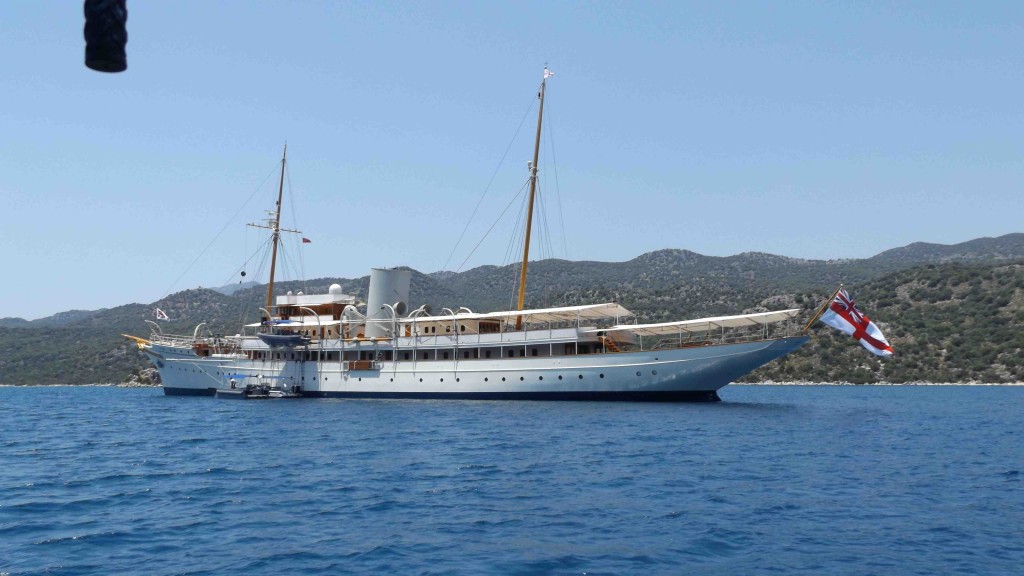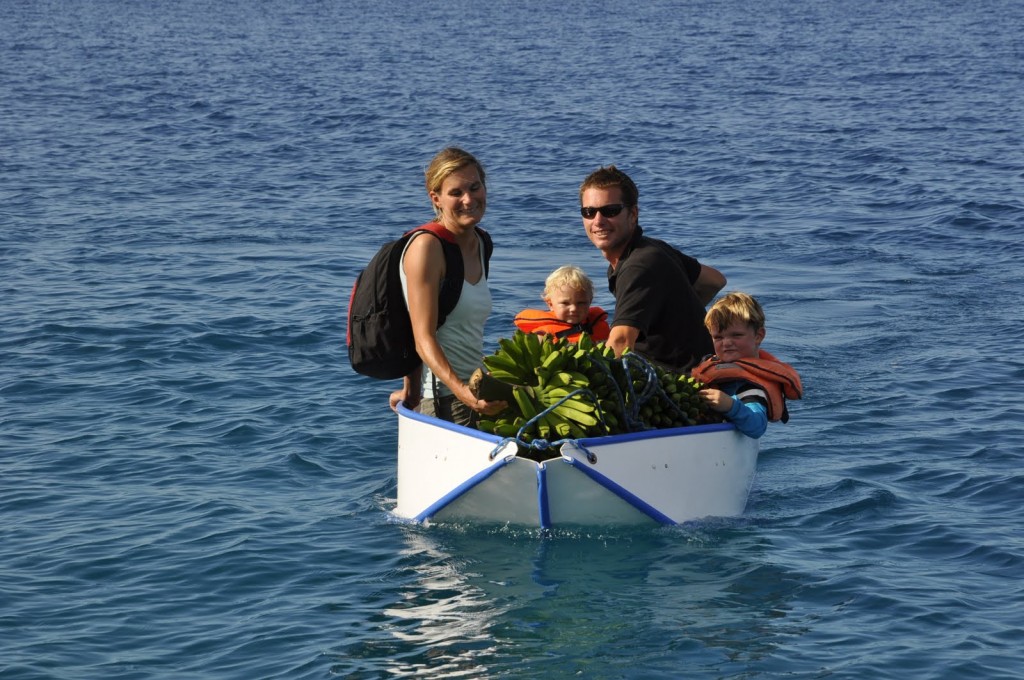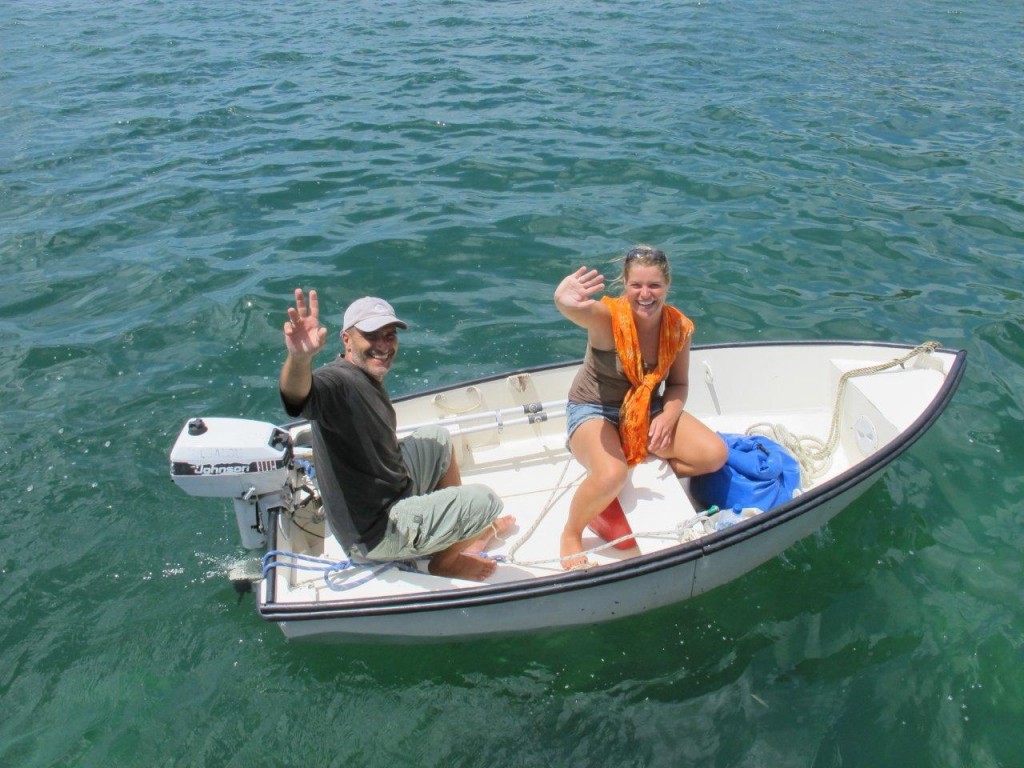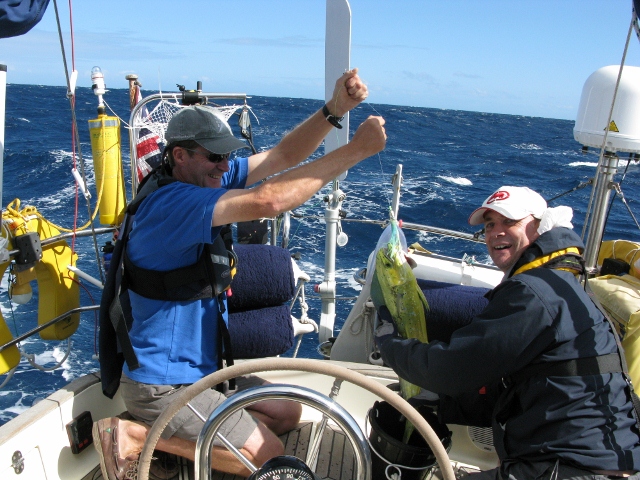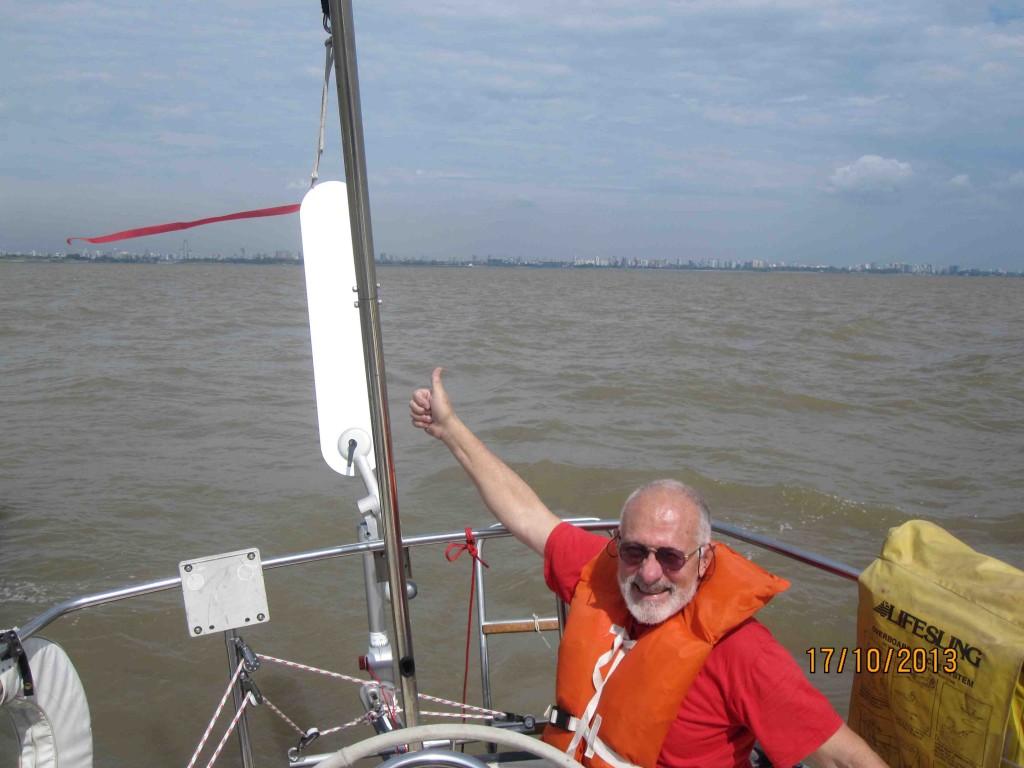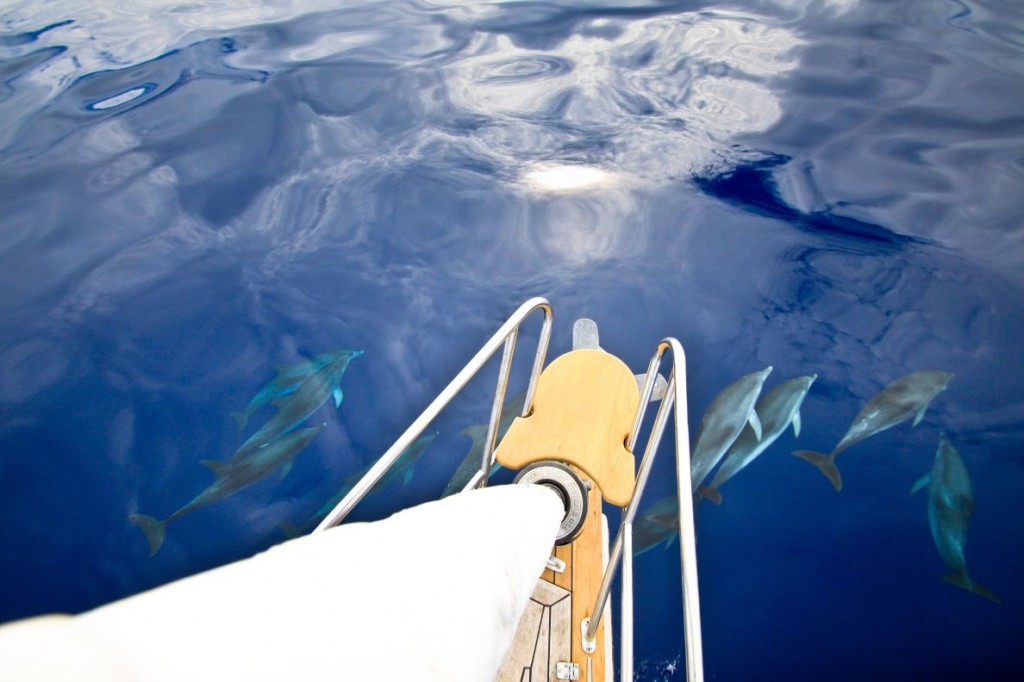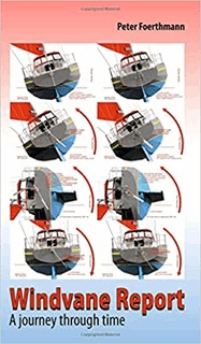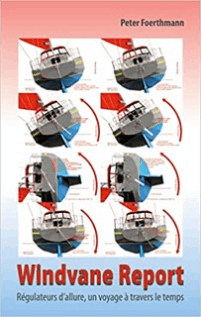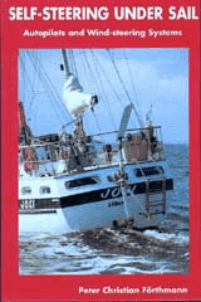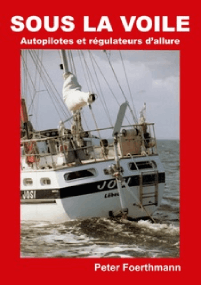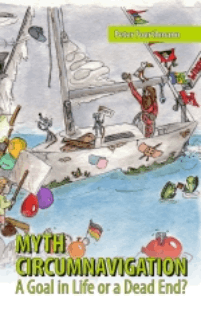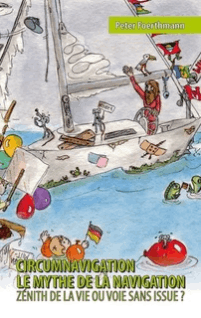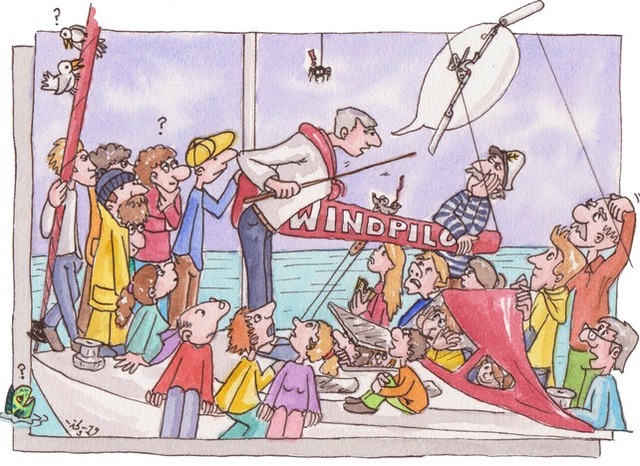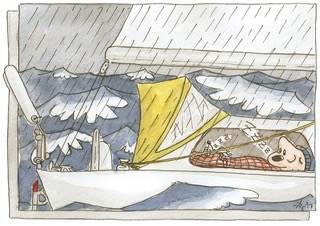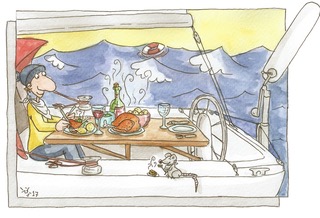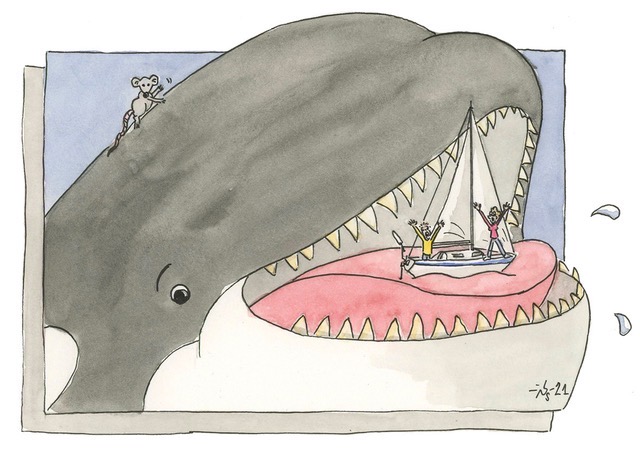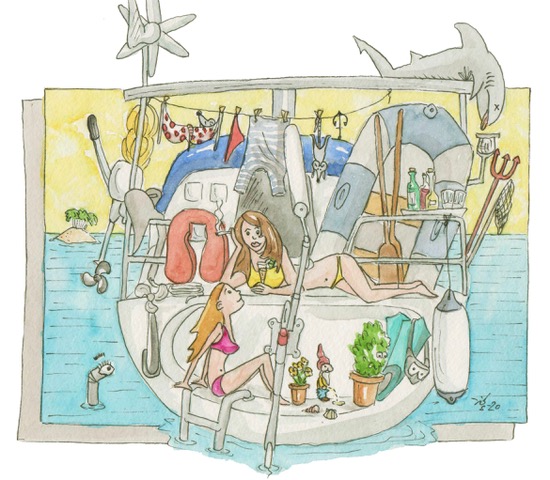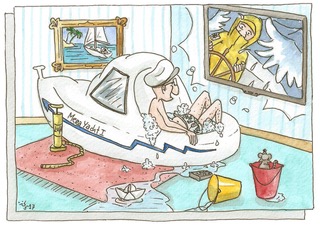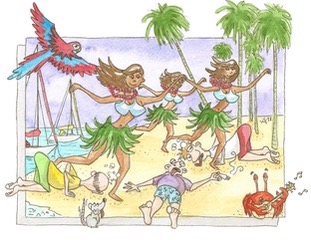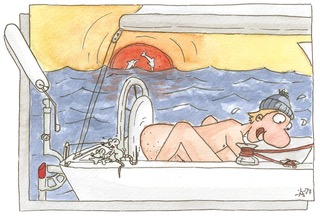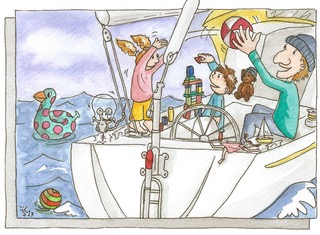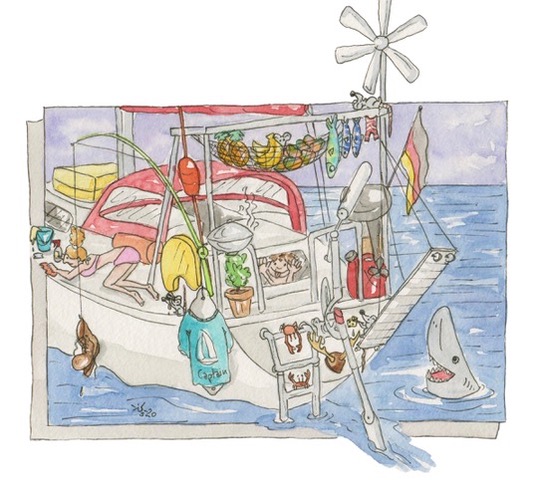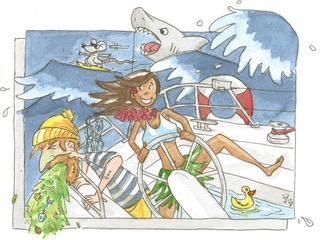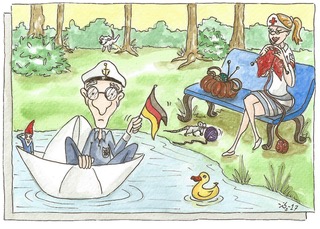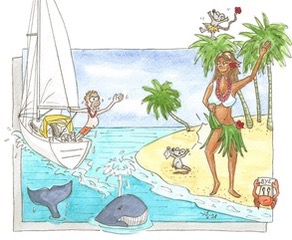In our dreams
Waterproofs, I would suggest, do not to feature much in most dreams of sailing around the world: fair winds, following seas and capable, entertaining (as you will) and steadfast company are much more the order of the day. Reality likes to paint a rather different picture, however, taking events – and with them relationships – in directions we never intended. Sometimes this just counts as part of the fun, but sometimes people find themselves having to reach an accommodation with their life rather than actively living it, at which point the bluewater dream becomes a solo exploit (or the boat stays at home).
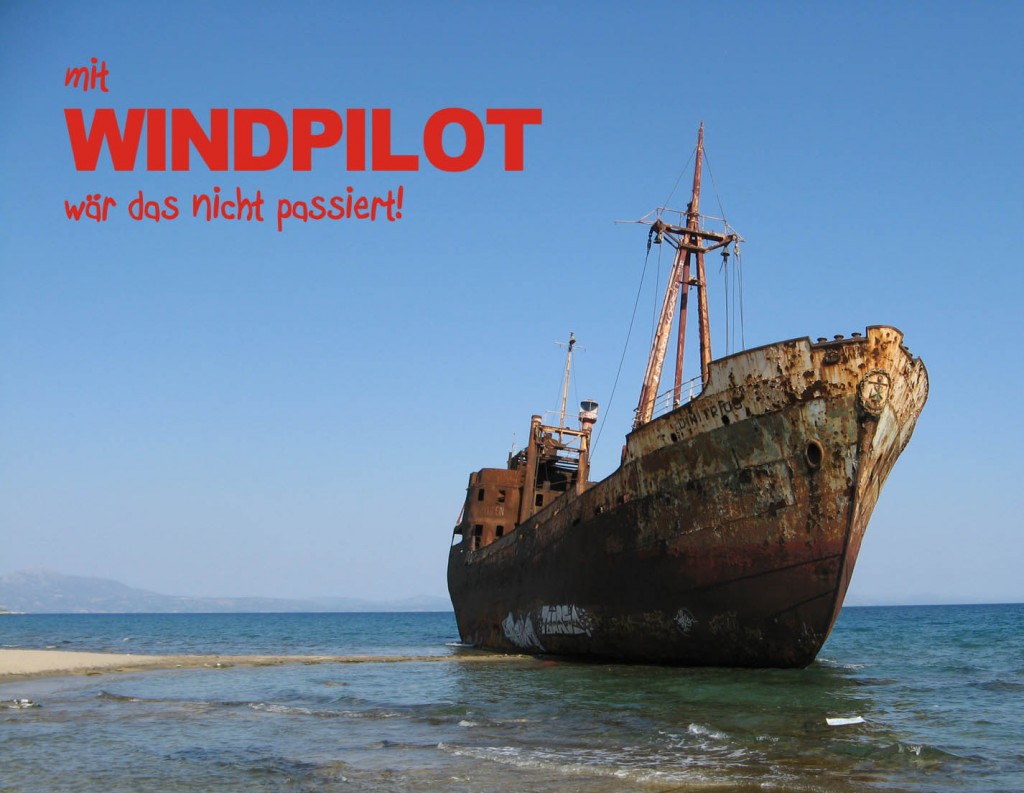 We live in a world that likes to commoditise dreams, to package them up as fodder for marketing gurus, publishers and the media, which then sell them on in carefully sanitised form in an exercise that brings the cash rolling in while simultaneously helping to keep the great majority of the population obediently in their hamster wheel hatching children, paying interest and generally doing and consuming what they are told without ever really questioning the status quo or trying to fashion a reality of their own.
We live in a world that likes to commoditise dreams, to package them up as fodder for marketing gurus, publishers and the media, which then sell them on in carefully sanitised form in an exercise that brings the cash rolling in while simultaneously helping to keep the great majority of the population obediently in their hamster wheel hatching children, paying interest and generally doing and consuming what they are told without ever really questioning the status quo or trying to fashion a reality of their own.
Some people see the burnout coming and take steps to avoid it, but what started out as a definite change of tack sadly all too often ends up as no more than a transition from one marketing category to another. “Feeling disillusioned sir? I have just the product for you!”
No, thank you.
So that’s the tune, but who is it paying the piper? The truth, I would suggest, is not as obvious as it might seem.
The short answer is that the most beautiful dreams are those we do not have to pay for ourselves. This appears at first to confer a clear advantage on those who, by dint of their ability to appeal to our more primal urges, are able to have their fun funded for them. The complicating factor for anyone contemplating this path, however, is that very often both sides will end up knowingly playing the same game – manoeuvring to get what they want without openly appearing to do so – and as a result both will finish up a long way from realizing the dreams they nurtured at the beginning.
As for the long answer, that leads us into hazardous territory and the risk of uncomfortable questions of the type many would no doubt prefer to avoid altogether. The subject of honesty – our willingness (capacity?) to be scrupulously honest with ourselves and with those nearest to us – is a Pandora’s Box some would rather have left firmly shut.
My intention here (whisper it softly) is to open this box – with care – and see what it might contain.
Responsibility
Social interactions and sociability among sailors were considered in a previous missive, which concluded that frequently it all comes down to ego. A little give here and there can be the unavoidable price of the steady take, take, take and sometimes a veneer of magnanimity helps to oil the wheels of exploitation, but for many, all life centres on me Me ME – and the life afloat is no exception.
One measure of success trumps all others for this mindset and that is wealth, expressed as it may be through symbols such as my partner, my car, my house and my yacht. And the order is by no means coincidental: it takes a particular kind of person to turn the “natural” – pecuniary – order on its head and make a virtue of his or her necessity. It has to be said though that a certain sleight of hand can creep in here:
experts at this game know their audience expects tall tales, so they tell them even taller to make the desired impression! Or so it would seem.
Lies, especially falsehoods concealed behind a painstakingly woven mask of honesty, seem to be just a fact life. Idealistically one might expect advancing years – with the increased financial resources, accumulated experience and evolved view of life’s priorities (not to mention a greater willingness to admit our own failings) that tends to accompany them – to change things somewhat. Unfortunately, for this theory at least, intractability increases in step with age and wisdom – that and the certainty that the younger generation has no respect for us and little interest in our knowledge.
Time and again the ego takes centre stage. Impatience rules – who has the time to be understanding (assuming they even know how) – and money is always tight because someone somewhere always has the perfect temptation lined up to part the materially-inclined from every little extra wealth that comes their way. The result, envy, increasingly becomes the driving force of existence, bringing its presence to bear on every decision until trying to satisfy it becomes an end in itself. And one easy short cut to dealing with envy is to go from coveting what others have to denigrating who and what they are (or are perceived to be). What more effortless way could there be to shift the focus away from one’s own shortcomings and the woolly countenance looking back in the mirror. Baaaaah!
Is there an easy answer?
No, in a word. If there was, we would surely have heard about it by now. So where do the resources come from?
This time there are several answers available – read on and take your pick. The ultimate dream, to live your dreams and be paid for doing so, is a kite that should only be flown indoors: expose it to the harsh light of day and jealousy will soon bring it crashing back to earth.
The classic (would-be) exponents of this technique are the sailor-authors, the recognised state of the art being to produce a book summarising the “achievement” (what the rest of us might call the voyage) at the end of the venture. Examples range from thrilling to downright tedious, from honest to almost totally fabricated, from factual to hugely exaggerated (there was even once a book that told of whales but had nothing to show of them but a drawing). The success of a book depends first and foremost on the style in which it is written. The journey, the towering mental anguish and excruciating physical suffering and the eventual heroic return are a given: the question is whether anyone wants to carry on reading all the way to the end. Books can inspire dreams – but not always. Publishers and Jeff Bezos know the score.
Making money out of sailing is an attractive idea – and an obvious one to anyone looking for ways to finance time afloat. Unfortunately the probability, as an author in the maritime genre, of filling the coffers on a scale sufficient to fund a lifetime in what can hardly be considered a low-cost arena remains vanishingly small. Writers face a rapidly changing market too: publishers, struggling to adapt, have no qualms about placing any financial failure at the feet of their authors while doing their level best to pare costs to the bone, chase down every last synergy and replace expensive experts with the free services of volunteers and interns in a desperate race to reach the bottom first and survive (after a fashion). Never has the black spot been handed out so freely!
Financing sailing through a website or blog is never easy, as it relies on generating sufficient clicks to attract advertisers and sponsors, who have plenty of choice about where to invest their funds. Something like the VOLVO OCEAN RACE may be able to generate sufficient capital to make the exercise worthwhile, but marketing shiny metal on wheels is a different game altogether to selling boats and associated gear. A sailing race around the world is simply a good way to access all the different markets: the
boats are eye-catching but essentially incidental (unless, of course, you happen to be one of the sailors/boatbuilders/sailmakers involved, in which case – well played!).
The right proposition turns the press organs of the world into willing heralds of the brand message. Full-colour high-res images, the “human story”: the news flows in almost hourly. And now we have animations too to bring even more of the experience to the sofa. Recast as media partners, elements of the press strain eagerly at the leash for the next carefully prepared titbit, snapping it up and racing to share it with the world: with professional event PR management reducing its role essentially to that of messenger, the press gets cheap content, the event gets the exposure it wants and everyone (who counts) is a winner.
If the pot is big enough, selected press princes/princesses can look forward to free flights, hotel stays and privileged access to help them with their reports – a game that plays out around the world at every host port for events like the ARC without most readers ever being any the wiser. The bill is ultimately footed by the unsuspecting sailors/car buyers who are willing to fork out in pursuit of their dreams (exit through the gift shop).
Sailor-bloggers operating under the aegis of a publisher – complete with honorarium and assured re-employment – are a hybrid invented by the publishing houses, presumably as a rearguard action to try and stop themselves being completely overwhelmed by global bloggomania (although bloggers, by their very nature as electronic communicators, must rank as the natural enemy of the paper-based faction).
There is a clear pattern worldwide of bloggers in the privileged position to receive a pecuniary reward from print magazines also being particularly keen on mining the banner ad seam. I suppose it appears the obvious next step: first draw them in and then it’s a case of “I’ll click yours if you click mine” (at least that must be the plan). The result, as we know to our cost, are click-trap websites where capturing the mouse is everything: once is quite enough!
Compared with the ordinary sailor, who has to shoulder his/her dreams alone with no prospect of a financial return until the writing is done, these hybrid bloggers have it easy. Their financial worries have been smartly offloaded before they so much as hoist a sail and all they have to do in return is report on progress to an interested readership – and not forget to throw in a few timely thank-yous to sponsors and supporters as courtesy, convention and naked self-interest dictate (see here for more thoughts on the matter of sponsorship in sailing).
Which is all perfectly understandable, I suppose, when publishers have but a few horses in the race and can only hazard a guess as to whether the investment in the brand will ultimately pay off. The critical question – which side has the best of the deal – takes a long time to answer because the key facts roll in only slowly. It seems quite possible to me that exploiting the print and online channels in combination will tend to benefit the author rather than the publisher, although the final verdict could be controversial because it will be the latter rather than the former who crunches the numbers and decides.
Experience in Germany has shown that successful long-term alliances between publishers and authors are far from the norm. If I may be so bold, I would suggest that no more than two people have managed to make this arrangement work – and their names will be instantly obvious to the typical German sailor/reader. Whatever their merits, the rest – and plenty have tried – have to face facts and acknowledge that man cannot live by sailing and writing alone.
Blogging to sail can create a Bermuda Triangle of conflicting egotistical interests too. Consider if you will the case of a cross-over blogger recently departed on a round-the-world trip (for example) who lets slip a suggestion that money is tight in his reports even though the project’s web site appears to be doing a healthy business in collecting financial contributions. One might almost be persuaded to recognise the idea of playing the mariner in need card on a venture already backed by a publishing house plus sponsors and donors – not to mention the beneficiary’s own family – as a marketing master stroke, but when everyday issues start regularly to be presented as potential deal-breakers (or, if you prefer, convenient excuses to return to port), one cannot help but by struck by the yawning gulf between the mighty marketing effort and the underwhelming commitment of the “hero”. Especially given the clear implication that it is the generosity or otherwise of sponsors and donors that will make the difference between sailing on and sailing straight back home. Are they laughing at us, I wonder?
Moving now into a completely different league in terms of elegance, we turn to the option of setting sail with Daddy’s boat (or Daddy’s assets in boat form) once Daddy, worn down by years of hard graft, finds that ill health, financial crisis or the dearly beloved family have driven a barge through his plans and he is no longer able to realise his life’s dream himself. Daddy’s loss is fortunate son’s or daughter’s gain – and it never ceases to amaze me how quickly awe, respect and gratitude for the efforts of diligent parents dissipate at sea and how shamelessly the offspring acquire a swagger and self-confidence that can be difficult not to interpret as arrogance.
These sorts of thoughts put me in mind of an eye-opening day I once spent in Las Palmas: I was doing my thing upgrading the back end of a yacht when the owner’s son appeared in the cockpit and asked my partner to remove herself from the shade of his bimini and find somewhere ashore to wait. The 17 mm wrench in my hand came pretty close to a watery grave, believe me, but I stayed cool and kept things polite – a failing I rue to this day!
Strangely though, putting the experience down in words has brought a fleeting smile to my face…
I have noticed that the self-confidence of these silver spooners grows at a rate inversely proportional to their own achievements in life. And I have also noted a not insignificant number of instances in which parents, having worked hard all their life to build a thriving business, hand over the reins to the next generation and set sail for the sun only to find, a few months down the line, that the golden eggs have stopped, the goose is on its last legs and the only hope is to race home double-quick and try to minimise the damage. Which can be a tall order indeed.
Such are the perils of success accompanied by reproduction!
Mixing family and sailing does not have to result in conflict/exploitation of course. Parents and their adult children can and do undertake bluewater trips together as family – family yacht Kire covered many thousands of miles as home to Erik Jörn and has also taken his son Paul and family around the world, for example. These happy exceptions seem to be in short supply though, which is a pity, not least because they offer significant financial advantages – two generations obviously have more earning power – and also extract more value from the boat, which spends far less time straining impatiently at its lines in port.
I have a particular respect for sailors capable of travelling the globe with a smile, a wave and no mention of the state of their finances. Catching up with the latest exploits of Inga and Vassil on Olgalou is always a pleasure, for example, and I am always happy to do whatever I can to help them (see also here). Inga has certainly helped me – and hopefully you – too, as it is from her pen that the cartoons enlivening much of my writing flow.
Big in America (although less so in Germany) are sailor-bloggers who sell their books and reports direct and live off the proceeds (for a list of sailor-bloggers see here). I anticipate imminent and dramatic change in the market for German-language writing – be it in print or online – on sailing matters. In fact the storm clouds are already gathering: if the prices of e-books drop to the levels that have become established for apps (with the beneficiary, similarly, being the actual author), public interest will increase rapidly and authors will find they have a reasonable business on their hands at the same time as the publishers, their print sales figures dropping steadily, struggle more and more even to cover their costs.
We already hear regular stories about the upheaval in the print media industry and I am on tenterhooks to find out what strategies the barons of the old world of print will come up with to keep themselves afloat as our sweet little marine publishing segment moves into a digital age they seem incapable of understanding. Evidence of the prevailing panic is everywhere to be seen, with each new round of consolidation following closely on the heels of the last, but it seems far from certain that all of this feverish activity will make any difference. I find it hard to envisage print sales recovering in any great measure: the print media could well become an irrelevance in our field (but stand down the chainsaws for now – the tree does still bear fruit occasionally).
Hier sind viele der Autoren aufzufinden
The state of the art
Most of us plan and fund our sailing adventures ourselves. How long it takes to advance from concept to implementation depends on all kinds of factors like how far we intend to go, how quickly and comfortably we intend to travel and what else we think we need to make the experience a success.
There seems little point in discussing the actual costs of boats because everyone has their own idea of “boat”. The literature and the supply of would-be advisors is immense and there have even been studies conducted to determine, retrospectively, the annual cost of living a particular dream. And as far as I can see all of these efforts have one thing in common: they become totally irrelevant as soon as the first halyard moves.
But anyway, how much should it cost to realise the dream? Few things are as sure to spark heated debate among established and prospective bluewater sailors as the quest to put a number on this issue. The answers, not surprisingly, vary as widely as the expectations, aspirations and lifestyles of those who put to sea, so for now I will focus on just three key factors:
– the boat
– life
– income, assets and reserves.
I suspect very few people would be happy to open the books and reveal their true costs simply because the whole issue immediately conjures the green-eyed monster of envy. And in any case the breakdowns of the actual costs of circumnavigators published in table form at the end of the adventure can never give more than a very rough indication because, as we all know, one man’s boat is another man’s tender, one woman’s luxury is another woman’s squalor and there’s just no accounting for luck. Sensible people can safely be left to work out their own budget.
Vast wealth is no guarantee of success. Much more important, I feel, is the ability to recognise what really matters in life – and what does not. Which thought brings me directly to Doris Zulauf and Andreas Bitterli (Andori): a more compelling and authentic voice on our sport than this couple, who took their Taranga all the way around the world (with all the ups, downs and challenges one would expect this to entail) with no more than a modest budget, you could not hope to find. Or take Barbara and Hans Rauert (Resolute): they crossed their outbound track last year to complete the full circle and remain as upbeat and grounded as ever, rising to the mental challenge of ticking that big box by … recharging, restocking, and carrying on sailing.
Murphy’s Law has no respect for national frontiers and it is impossible to predict if/when something expensive is going to happen: stuff breaks, people fall ill, sometimes people just need to jump on a plane home and check in with friends and family before the next leg of the voyage.
In conclusion
I’ve blogged it before and I may well blog it again: the world – and with it our world of long-distance sailing – has changed. People have changed as well, at least there seems to be rather more egocentricity around than there used to be. Security has become more of a concern too, with piracy much more common and envy and theft almost ubiquitous.
Changes in personal circumstances, illness and family emergencies certainly also do their bit to rewrite the best laid bluewater plans, but probably the greatest challenge for bluewater sailors at the moment is loss of income due to flat-lining interest rates. Sailors tend in my observation to be conservative with their money, not least I suppose because it is difficult to monitor and manage fast-moving speculative investments from the middle of the ocean. It is surely no accident that recent years have seen so many bluewater sailors put their plans on hold, sell their boat half way around or just ship it home as deck cargo. Anyone requiring further evidence need look no further than the collapse in prices for big yachts.
Not so long ago, people could save up ahead of the Big Trip and then fund themselves largely out of interest income. Those days are over now, for the time being at least, and I am sure this goes a long way to explaining why so many sailors, remembering that they will still have a life to finance when they get back on dry land, are rethinking their plans and goals.
The genie in the bottle
My advice, for what it’s worth, is never to proclaim (admit) in advance that you intend to sail all the way around: showing your cards precipitately ratchets up the pressure of personal and outside expectation unnecessarily. Once at sea, you want to be able to experience and enjoy every day as it comes without feeling the weight of expectation – or envy – from those you have left behind and without finding yourself pushing on simply to avoid disappointing your well-wishers, proving the naysayers right or breaking what has come to be seen as a promise.
Once the genie of conflicting social pressures slips out of the bottle it permeates everything in the ship’s paradise, even relations between Adam and Eve. A life without dreams would be barely a life at all, but sharing your dreams too widely can leave you in debt to them. Sailors, like other dreamers, are not immune to the temptation of publicising great plans as a means of therapy for a needy ego, but a declared circumnavigation that terminates short of the full distance will be perceived as a defeat even if the journey itself was wonderful.
We struggle sometimes to acknowledge what others have achieved without simultaneously pointing out where they have come up short. Whatever our preconceptions and however events play out, there remains a voice at the back of our head that always wants to find a way to be able to say: “See, I told you so!”
Well sometimes anyway!
Peter Foerthmann



